The Army ROTC Purdue Hall of Fame celebrates the service and accomplishments of distinguished alumni who have served in the United States Army Reserve Officers' Training Corps (ROTC) program. Among those who have made significant contributions to the ROTC and the United States Army are Frederic Elbert, Brian Moore, Ronald Snyder, Clarence Kaiser, and Karen Gibson. These five individuals embody the excellence and dedication that Purdue Army ROTC instills in its graduates. Their service, leadership, and accomplishments are a testament to their character and to the strength of the ROTC program. Below are details on each of their outstanding contributions to the Army and the nation.
Inductees
Frederic Elbert, Colonel, USA (Retired)
Class of 1984
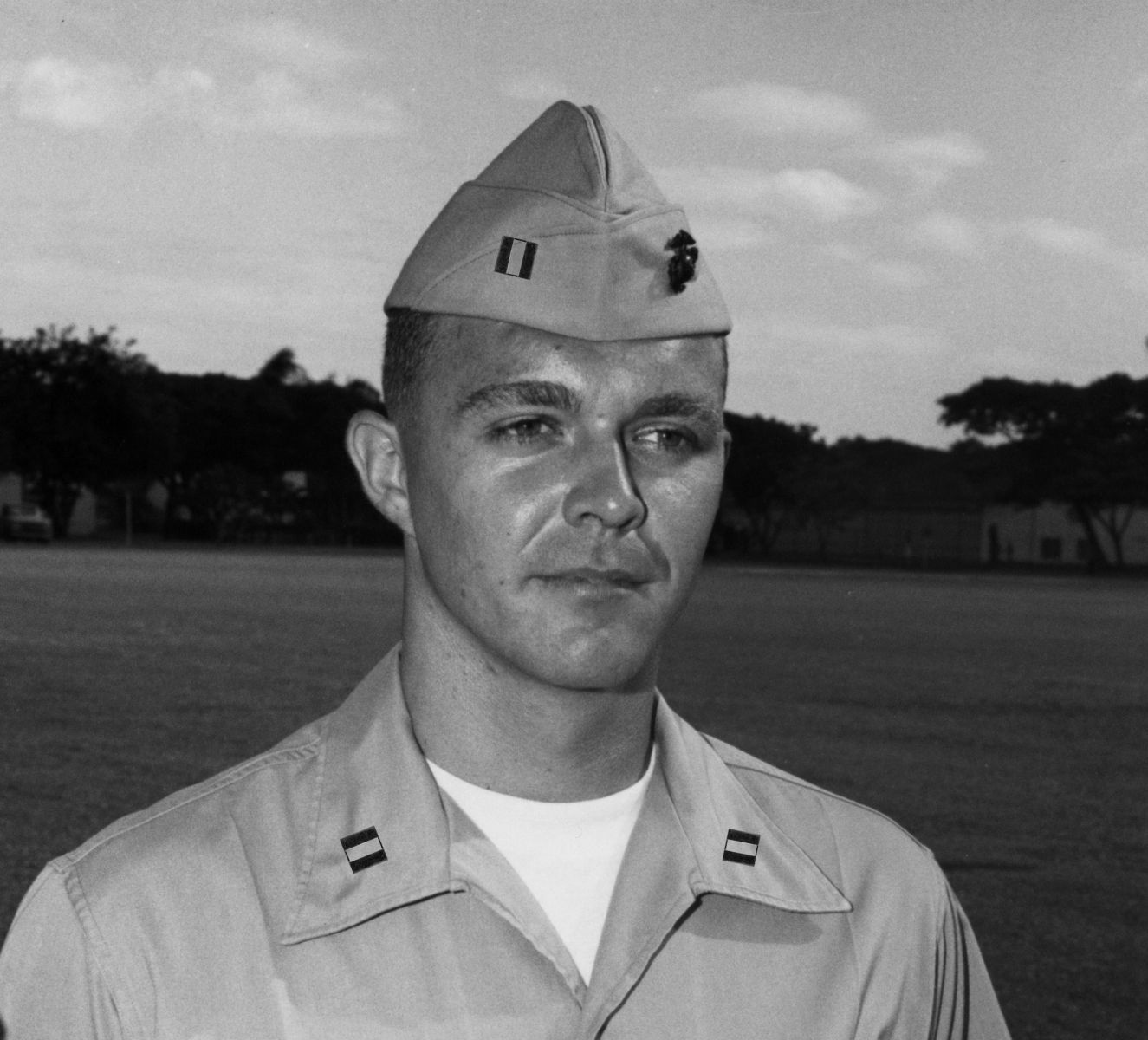 Colonel (Retired) Fred Elbert received his commission in 1984 after completing four years of Purdue Army ROTC earning his B.S. in Mechanical Engineering. His first Active Duty assignment was at Fort Drum, New York, where he was platoon leader of two engineer platoons, company executive officer, and battalion plans officer. Significant accomplishments included publishing platoon level light engineering tactics and earning the Sapper tab.
Colonel (Retired) Fred Elbert received his commission in 1984 after completing four years of Purdue Army ROTC earning his B.S. in Mechanical Engineering. His first Active Duty assignment was at Fort Drum, New York, where he was platoon leader of two engineer platoons, company executive officer, and battalion plans officer. Significant accomplishments included publishing platoon level light engineering tactics and earning the Sapper tab.
After leaving Active Duty, Colonel Elbert spent 21 additional years in the Army Reserve starting at the battalion level, where he served as assistant operations officer, company commander, battalion operations officer, and battalion executive officer. Accomplishments during this period included leading the transformation of an engineer battalion from wheeled to mechanized, a critical event for this unit's future deployments to Iraq and Afghanistan.
During his time on a Facilities Engineering Team, Colonel Elbert deployed to Bosnia for Operation Joint Guard. There he managed all projects on US base camps and provided professional level engineering services to Active Duty engineer units.
As a Brigade Construction Officer, Colonel Elbert was responsible for military construction projects across the US overseeing 300 projects and 2,000 military construction personnel. Colonel Elbert was then selected Brigade Design Engineer, deploying his design team to Iraq during Operation Iraqi Freedom. His design team executed numerous design and infrastructure assessment missions across the US area of responsibility; including the first ever field employment of advanced modeling software for basecamp security. Colonel Elbert received the Combat Action Badge and Bronze Star medal for service in Iraq. Upon completion of his tour, Colonel Elbert was assigned as an Assistant Brigade Commander, overseeing the activities of two subordinate engineer battalions.
Throughout his Army Reserve tenure, Colonel Elbert maintained a successful civilian engineering career and is a licensed Professional Engineer. As a design engineer, he developed expertise in robotics, industrial controls and machine design. Successive positions included engineering management and business unit leadership. Colonel Elbert is the Principal of Elbert Field Engineering Solutions, a Veteran Owned Small Business that , specializes in engineering support, project management, and construction management for the installation of heavy industrial equipment.
While raising three children, two of whom have had Army careers, Colonel Elbert spent over ten years as a volunteer leader in the Boys Scouts of America, and as a mentor to high school students in a local STEM program. Colonel Elbert has four fantastic grandchildren. When he is not working on his business, he spends as much time as he can duck hunting with his son and fishing with his grandkids. He is married to Sherry Finkel Murphy, a financial planner.
Brian Moore, Colonel, USA (Retired)
Class of 1993
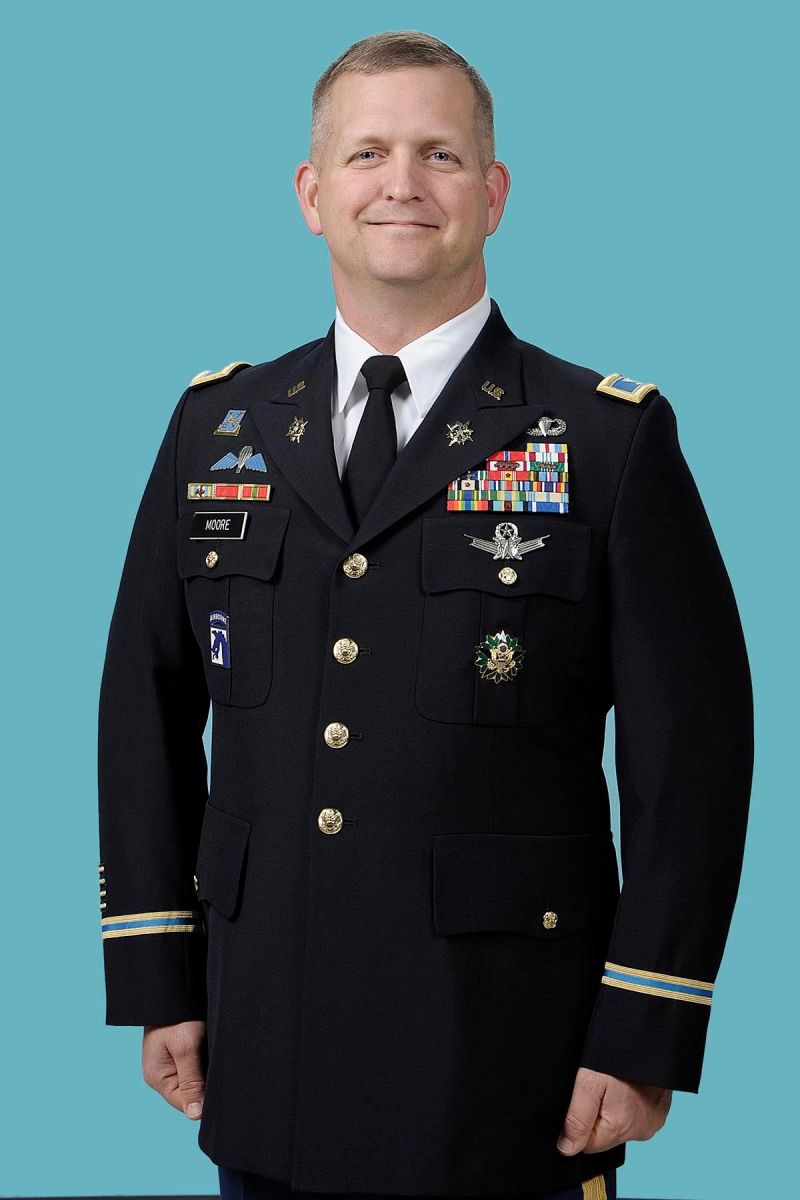 Brian Michael Moore graduated from Purdue University in 1993 with a Bachelor's of Science in Aeronautical and Astronautical Engineering. Upon graduation 2LT Moore was recognized as a Distinguished Military Graduate and commissioned as an Army Military Intelligence officer and assigned to Fort Irwin, California.
Brian Michael Moore graduated from Purdue University in 1993 with a Bachelor's of Science in Aeronautical and Astronautical Engineering. Upon graduation 2LT Moore was recognized as a Distinguished Military Graduate and commissioned as an Army Military Intelligence officer and assigned to Fort Irwin, California.
After leaving Fort Irwin, California, CPT Moore was assigned to the 2nd ACR as the Squadron Intelligence Officer and was the first CONUS-based unit deployed to conduct peacekeeping operations in Bosnia- Herzegovina. During his time in Bosnia-Herzegovina CPT Moore lead numerous briefs in support of special security events and theatre logistics as well as intelligence collection and analyzation in preparation for unit redeployment operations.
Upon promotion to MAJ and assignment to 8th Army, located at Yongsan Army Garrison in the Republic of Korea, MAJ Moore served as the lead planner in the Setting the Force plan that aimed to reduce U.S. forces in the Republic of South Korea from 37,500 to under 25,000. His planning was instrumental in identifying options for the Army that also maintained United States' critical strategic alliance with South Korea.
While assigned to the Future Warfare Center in Arlington, Virginia, MAJ Moore oversaw the Army's first Space Control Integrated Capabilities Document before being assigned to the Pentagon. During his assignment at the Pentagon MAJ Moore was the lead action officer for developing the Army Space Policy which led to the publication of Army Regulation 900-1- Army Space Policy in 2009.
Recognized for his potential, LTC Moore was assigned to the XVIII Airborne Corps at Fort Bragg, North Carolina, as the Chief of Space and Technical Operations where he lead dozens of highly classified programs. LTC Moore subsequently deployed in support of Operation New Dawn. One he returned stateside LTC Moore has handpicked to lead Space Control Development efforts in the Space and Missile defense Command's Future Warfare Center at Redstone Arsenal, Alabama.
COL Moore was selected to attend the War College and was assigned as the Director of Operations and Exercises for Joint Functional Component Command - Space (JFCC-Space upon completion.. Upon leaving what subsequently became U.S. Space Command, COL Moore was assigned as the Deputy Chief of Staff for Operations of U.S. Space and Missile Defense Command where he oversaw an exceptionally broad portfolio of space and missile defense forces supporting geographic combatant commands across the world, providing around the clock support.
Ronald Snyder, Colonel, USA (Retired)
Class of 1956
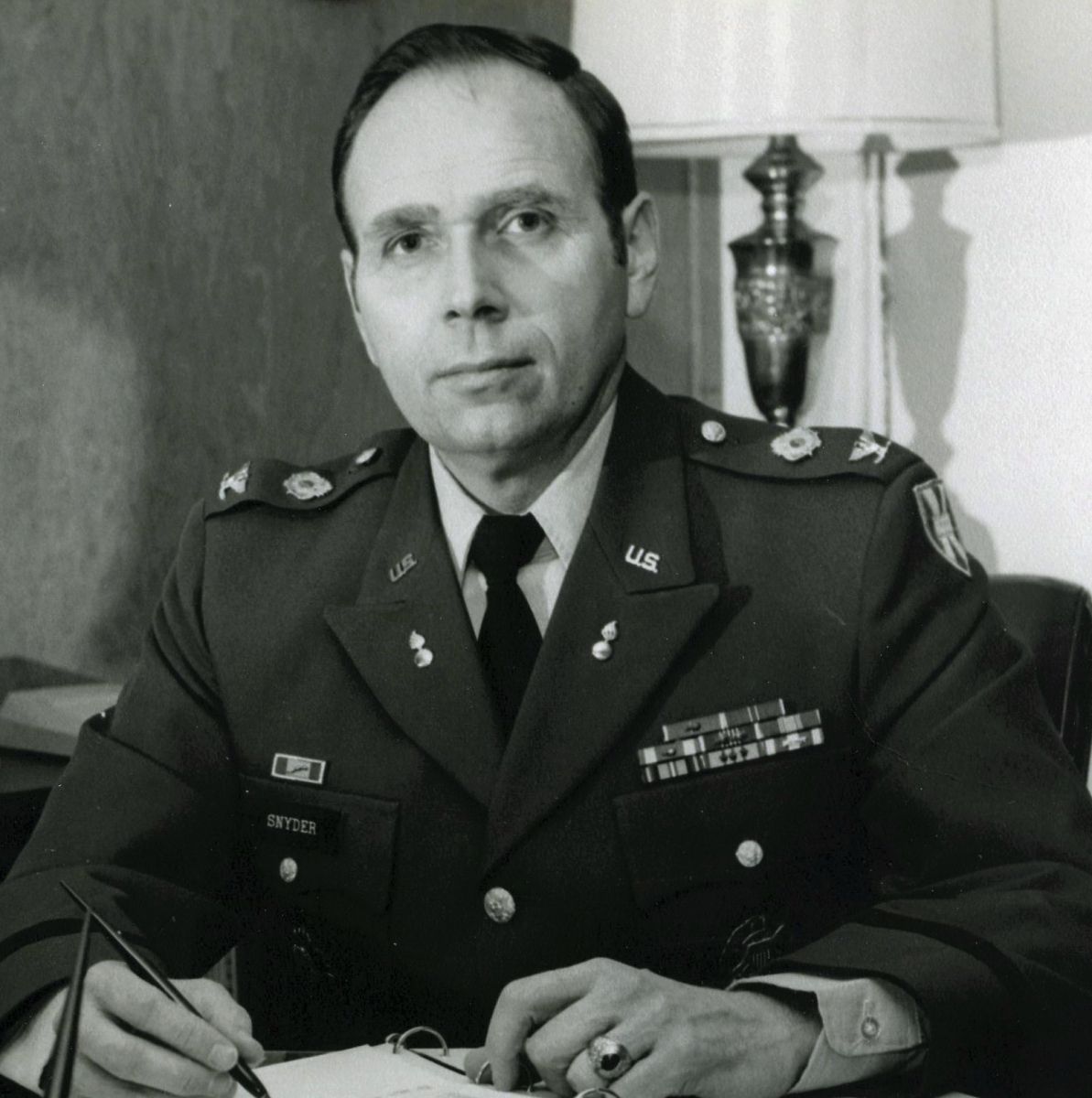 Ronald E. Snyder graduated from Purdue University with a Bachelor's of Science in Chemistry in 1956. COL Snyder was commissioned as a Distinguished Military Graduate and a Chemical Officer. Early in his career COL Snyder worked as a platoon leader and staff officer at Fort McClellan and in Europe before eventually branch transferring to the Ordnance Corps. COL Snyder is a graduate of the Industrial College of the Armed Services and the Army War College.
Ronald E. Snyder graduated from Purdue University with a Bachelor's of Science in Chemistry in 1956. COL Snyder was commissioned as a Distinguished Military Graduate and a Chemical Officer. Early in his career COL Snyder worked as a platoon leader and staff officer at Fort McClellan and in Europe before eventually branch transferring to the Ordnance Corps. COL Snyder is a graduate of the Industrial College of the Armed Services and the Army War College.
During the Vietnam War, COL Snyder initially served as the G3 and was responsible for establishing administrative and security procedures for a move into a newly constructed building on Tan Son Nut airbase. After leaving the G3 COL Snyder became the Chief of the Management Branch of the U.S. Army Ordnance School, Fort Lee, Virginia. While at the Ordnance School COL Snyder was instrumental in developing Automatic Data Processing (ADP) and Operations Research/Systems Analysis (ORSA) into viable programs that could be used to teach future leaders to analyze complex subjects in a rapidly changing military environment.
After completing his time at the Ordnance School, COL Snyder became the G4 of the Combined Corps Group in the Republic of Korea and planned a joint fall Wargame. After a successful stint as the G4 COL Snyder was recognized for his outstanding potential and was appointed as the commander of the Radford Army Ammunition Plant where he oversaw the production of TNT and propellant for use by the Army. The Army again recognized COL Snyder for his success and potential when it assigned him as the commander of the Miseau Army Depot and 60 Ordnance Group who was responsible for the storage and maintenance of all Army conventional ammunition and ordnance disposal operations within Europe. For his efforts COL Snyder was awarded the Legion of Merit with a Second Oak Leaf Cluster.
For his last stint in the military COL Snyder was the Chief of the Resources and Systems Integration Division within the Army Material Command. As the Chief of the Resources and Systems Integration Division COL Snyder was responsible for working with subordinate commands in the planning, programming and development of the resources, coordination with the Army staff and the wholesale Army Stock Fund, and the Program Maintenance and Program Supply position of the Operation and Maintenance Appropriation. COL Snyder was again recognized for his hard work and dedication with the awarding of the Legion of Merit with a Third Oak Leaf Cluster.
After 27 years of service COL Snyder retired from the Army and went on to work as a program manager and Director of Production for the Atlantic Research Corporation. Outside of work, COL Snyder served as the President of the Washington Metropolitan Golf Association which conducts all male U.S. Golf Association tournaments within a 60-mile radius of Washington D.C. In addition to his time in the Washington Metropolitan Golf Association, COL Snyder spearheaded the extensive renovation of two military golf courses located on Fort Belvoir. His commitment and dedication to the community resulted in both courses not only remaining, but also seeing updates to ensure they would remain community resources for years to come.
Clarence J. Kaiser, Colonel, USA (Retired)
Class of 1952
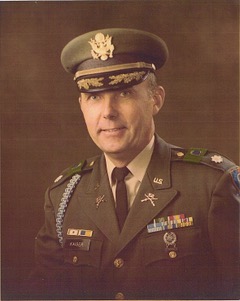 Clarence Kaiser was born in Eckerty, Indiana. In 1948 Clarence Kaiser began attending Purdue University where he majored in Agricultural Administration and was a member of the Alpha Kappa Lambda Fraternity. In 1952 Clarence Kaiser graduate from Purdue University and commissioned into the Army Artillery Corps. After commissioning 2LT Kaiser attended The Artillery School at FT Sill, Oklahoma.
Clarence Kaiser was born in Eckerty, Indiana. In 1948 Clarence Kaiser began attending Purdue University where he majored in Agricultural Administration and was a member of the Alpha Kappa Lambda Fraternity. In 1952 Clarence Kaiser graduate from Purdue University and commissioned into the Army Artillery Corps. After commissioning 2LT Kaiser attended The Artillery School at FT Sill, Oklahoma.
COL Kaiser served 42 years in the United States Army including active duty in Korea (1953-1954), US Army Reserve and the Indiana Army National Guard. He is a member of the Indiana Committee for Employer Support of the Guard and Reserve and a member of the Indianapolis Squadron of the Civil Air Patrol, an auxiliary to the U.S. Air Force. COL Kaiser is an Honorary Colonel of the 152nd Infantry Regiment and an honorary Brigadier General in the Illinois State Militia. Colonel Kaiser is a member of The American Legion and the Veterans of Foreign Wars. Over his 42 years of Active Duty, US Army Reserves, and Indiana Army National Guard COL Kaiser in the Artillery, Infantry and Armor branches and served in locations including Japan, Korea, and Puerto Rico among others.
COL Kaiser's contributions were not limited to the military. Doctor Kaiser, Professor Emeritus of Agronomy at the University of Illinois, amassed over 40 consecutive years of professional service including research, teaching, and administration in agriculture during his career in the public sector. His work focused on forage crop production and pasture management systems that: evaluate forage based energy efficient soil-plant-animal production systems; identify seasonal distribution patterns of forage crops synchronized with livestock production; and sequential grazing techniques that optimize feed-livestock efficiencies at prevailing economic conditions. During this period, more than 325 publications were written for students, producers and professionals.
Outside of the military and academics COL Kaiser and his wife raised 3 daughters and he during the 1980s, he became a member of the Civil Air Patrol (CAP and flew as a Mission Pilot until 2006 when he was deemed not medically qualified to fly. After ceasing to fly COL Kaiser became a Mission Scanner and Observer. He has been a member of the Civil Air Patrol over 30 years and is active in a number of community boards including the Crawford County Indiana Veterans Memorial Board. COL Kaiser worked tirelessly with members of the community to raise the funds for a veterans war memorial for the county.
Karen H. Gibson, General, USA (Retired)
Class of 1986
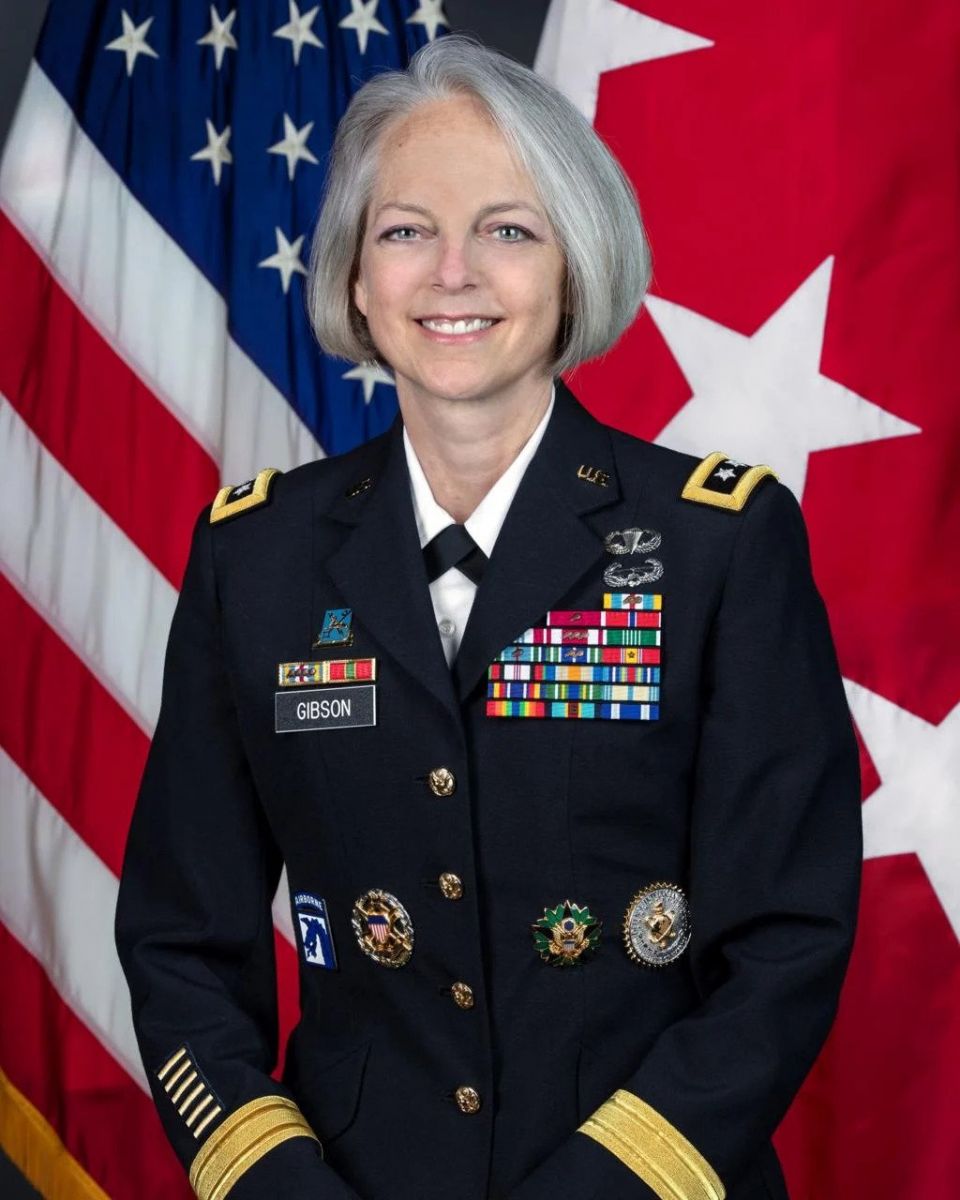 Lieutenant General Karen Gibson retired in 2020, culminating her 33-year active duty military career in the Office of the Director of National Intelligence as the Deputy Director of National Intelligence for National Security Partnerships. As of 3 March 2021, she was named the Senate Sergeant at Arms (SAA). She will serve as the protocol and chief law enforcement officer and is the principal administrative manager for most support services in the Senate.
Lieutenant General Karen Gibson retired in 2020, culminating her 33-year active duty military career in the Office of the Director of National Intelligence as the Deputy Director of National Intelligence for National Security Partnerships. As of 3 March 2021, she was named the Senate Sergeant at Arms (SAA). She will serve as the protocol and chief law enforcement officer and is the principal administrative manager for most support services in the Senate.
A seasoned combat veteran, LTG Gibson has a depth of experience in the intelligence and cyber fields directly supporting U.S. national security objectives in Iraq, Afghanistan, East Africa, Korea, the Pacific, and across the Middle East. As Director of Intelligence for U.S. Central Command, she wielded National and Defense intelligence assets ranging from clandestine ground operatives to the most exquisite technical collection from space to support national security objectives and military operations in one of the world's most complex operating environments.
Other prominent roles she served in include Director, CJ2, Combined Joint Task Force-Operation Inherent Resolve; Deputy Commanding General for U.S. Army Cyber Command's Joint Force Headquarters; and Director, CJ2, Combined Joint Task Force Horn of Africa. Throughout her career, she worked closely with allies and foreign partners from many continents to develop partnerships that protected national interests while supporting mutual goals. Her deep background as an intelligence practitioner gives her unique insights into how best to employ data collection, integration, and analysis to solve real world problems.
LTG Gibson holds a Bachelor of Science in Industrial Engineering from Purdue University, a Master of Science in National Security Studies from the National Defense University, and a Master of Science in Strategic Intelligence from the National Intelligence University. She is currently an Adjunct Assistant Professor at Georgetown University teaching Strategy, Policy, and Military Operations.
